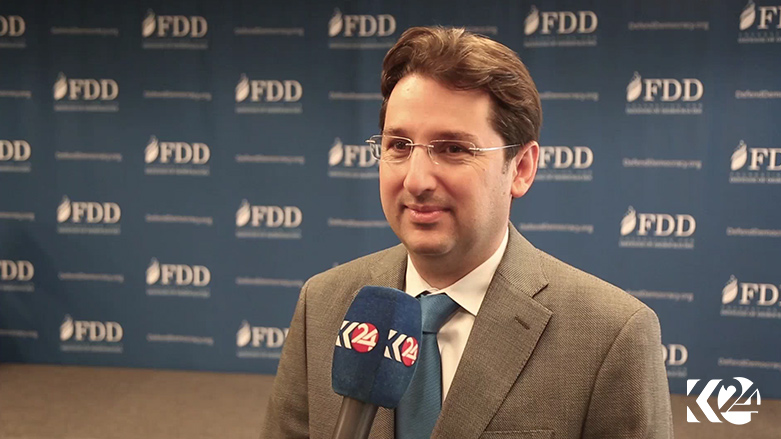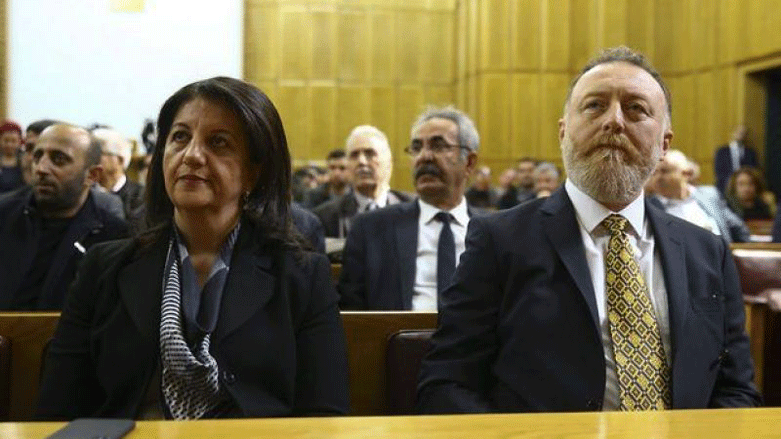Pro-Kurdish HDP 'only US-friendly political party' in Turkish Parliament

WASHINGTON DC (Kurdistan24) – Of the five political parties in Turkey’s parliament “only the pro-Kurdish HDP [People’s Democratic Party] refused to join” in support of a declaration, issued by the other four parties, condemning the newly-imposed US sanctions on Turkey, Dr. Aykan Erdemir, a former member of the Turkish parliament, explained to Kurdistan 24 on Thursday.
“The HDP does appear to be the only US-friendly political party in the Turkish parliament,” Erdemir, now a Senior Fellow at the Foundation for Defense of Democracies, stated.
Noting that Turkish President Recep Tayyip Erdogan said little on Thursday after Wednesday’s announcement of punitive US measures against Turkey’s Justice and Interior Ministers, Erdemir suggested that Erdogan’s silence was “very telling.”
“I think President Erdogan is trying to maintain some room for maneuvering,” he said. “In similar cases with Russia and Germany, he did take a U-turn,” and he might do the same now, Erdemir suggested.
Ankara’s first response to the US measure was to threaten retaliation, as Turkey’s official Anadolu Agency tweeted a statement on Wednesday from Foreign Minister Mevlut Cavusoglu, saying the “US attempt to impose sanctions on our two ministers will not go unanswered”—Cavusoglu’s last public statement before meeting Friday with US Secretary of State Mike Pompeo.
Asked how Turkey might retaliate, Erdemir cited a precedent from last October, when the State Department introduced visa restrictions on Turkish citizens. Turkey responded by introducing the exact same visa restrictions against US citizens.
“This time around,” he said, “we might expect similar retaliation—that is Turkey might sanction two secretaries, possibly the Attorney General and maybe the Secretary of Homeland Security.”
Erdemir also noted that “Turkey’s pro-government media” is “pounding Americans and US institutions hard,” and he anticipates “a spike in anti-American rhetoric around the country.”
That will likely have “repercussions for Kurds” in both Iraq and Syria. “Often, moments of crisis in Turkey lead to a nationalist upsurge,” along with “anti-Kurdish sentiment,” he explained.
That sentiment targets Kurds within Turkey, as well as Kurds across its borders. In Turkey, “anti-American rhetoric easily blends into an anti-Kurdish rhetoric,” he said.
The major leverage that Turkey has over the US is access to Incirlik air base. Erdemir does not think that tensions will escalate to the point that Ankara actually denies the US access to the facility, although it might threaten to do so.
“The Turkish government knows that Incirlik airbase is a silver bullet that you can only use once,” he said.
“Often the Turkish government will refer to blocking access” to Incirlik, but it “refrains from going forward with its threat.” And this time, “I think this is also going to be the case.”
Erdemir noted the irony of the pro-Kurdish HDP being the only Turkish political party now that is friendly to the US.
The party comes out of a “progressive tradition” in Turkey, associated with 1968, student protests, and anti-American sentiment.
But 50 years is a long time, and the HDP is “refusing to join the nationalist upsurge,” Erdemir explained.
Paul Davis, a former Pentagon analyst of Kurdish affairs and presently a Fellow at Soran University, emphasized to Kurdistan 24 the significance of the HDP’s friendly attitude to the US.
Davis noted that the Kurds in Iraq and in Syria are the most pro-American groups in each country. They also govern their areas better than the central governments or any other political authorities in those two countries.
Indeed, last week, Maj. Gen. Felix Gedney, Deputy Commander, Strategy, and Support, for the US-led coalition against the Islamic State (IS), described northeast Syria, which is administered by the Kurdish-led Syrian Democratic Forces (SDF), as “some of the most peaceful and stable parts of Syria.”
In fact, Gedney explained that Syrians fleeing violent and unstable parts of the country were moving into the area “to benefit from that peace and stability.”
In Iraq, the safest area for Westerners is the Kurdistan Region. As Rep. Steve King (R, Iowa) told a Washington audience last summer, “visiting Kurdistan” is like leaving “the desert” and going to “a garden of Eden that is green, beautiful, and productive.”
“It’s safe, and you can walk the streets without a vest and without a security detail,” King said.
So Davis asked, “Then why doesn’t the US support these people?”
“They are pro-American, and they govern their own territory better than most of their neighbors, including the states that the US insists they remain a part of.”
Davis complained that US policy was “incredibly counter-productive” and reflected “a lack of any real understanding of the region.”
Editing by Nadia Riva

